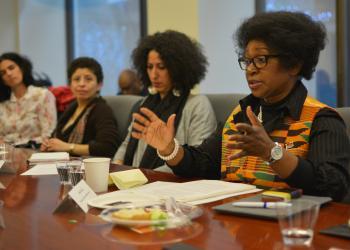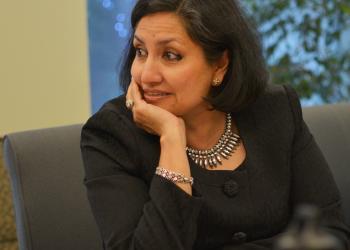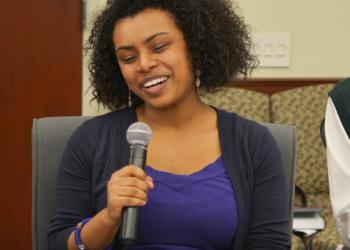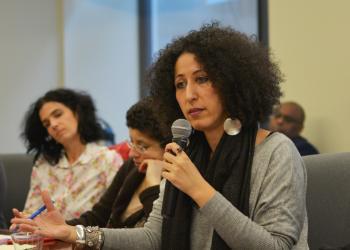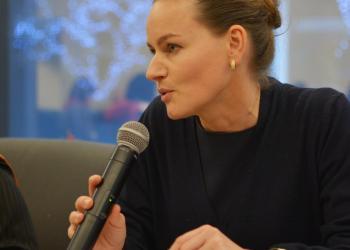Impact of religious messages on gender equality explored in advance of Beijing + 20
How can religious beliefs that place men above women be reconciled with international norms on gender equality? Can negative religious justifications about gender inequality be reversed? What is the impact of such messages across the lifespan of a human being?
These are among the questions being explored in a series of conversations about the connection between religious belief and gender equality over the next few months in advance of the March meeting of the UN Commission on the Status of Women (CSW), which is commemorating this year the 20th anniversary of the Fourth World Conference on Women and is known as Beijing +20.
The first such conversation was held 17 December 2014 at the offices of the Baha’i International Community (BIC). It focused on the impact of religious messages about gender during childhood.
“Interpretations of religious doctrines as assigning inferior status to women and girls have given rise to patriarchal systems which continue to obstruct women’s full participation in society,” said Bani Dugal, the principal representative of the BIC to the United Nations, in introductory remarks.
“Such messages of inequality are conveyed even before the birth of a child and continue on into old age,” she said.
The aim of the series, which is being co-sponsored by the BIC, the United Nations Population Fund (UNFPA), UN Women, and the World YWCA, is to explore the impact of religious messages on gender equality along all of the major phases of life.
“It is our hope that we will through these conversations be able to become more conscious of the way we communicate and find ways to identify and convey positive messages that would be empowering to both girls and boys,” said Ms. Dugal.
In January, she said, a meeting will be held to explore the impact of religious messages during adulthood, while the meeting in February will examine how older persons are affected by religious messages about gender.
In March, during the CSW itself – which this year will commemorate 20 years since the ground-breaking 1995 Fourth World Conference on Women in Beijing – there will be an event highlighting the entire series, she said.
The December conversation featured remarks by three panelists, followed by a lively exchange among all participants.
The panelists were Janet Karim, first secretary for social affairs of the Mission of Malawi to the UN; Maha Marouan, associate professor of African-American Studies and Women Studies at Penn State University; and Saskia Schellekens, special adviser to the UN Secretary General’s Envoy on Youth. Three youth respondents – Selamawit Adugna Bekeleo from Ethiopia, Mtisunge Kachingwe from Malawi, and Christian Guaman from the United States – also participated.
Ms. Karim discussed some of the tensions she observed in Malawi when some religious groups sought to block new national laws promoting equality of women and men.
“Quotes from religious books such as the Bible were often quoted as proof that women were not meant to be leaders,” said Ms. Karim.
She observed, however, that there is much in the sacred writings of many religions to support equality. “When Jesus rose from the dead, the first people he met were women,” she said. “So that should show that God is fair.”
Dr. Marouan said religion plays a very important role in most people’s lives, whether directly or indirectly. “Religion can be a source of health, it can create community and support,” she said.
“Religious discourse can also contribute to gender inequality, sometimes in direct ways and sometimes in subtle ways,” she said.
Explicit messages could be as simple as “women don’t deserve to have education,” she said. “Or it could be as implicit as telling girls that women cannot be leaders.”
Ms. Schellekens said “cultural and religious practices based on patriarchal norms and women’s repression are major obstacles that can reinforce stigma and discrimination and can also affect the design and implementation of laws and policies.”
While religious belief “can be a source of sustenance” for many, she said, “religious expectations can be barriers to the empowerment of women and girls in particular.”
“Expectations can be especially harmful to girls,” she said. “They may find that they are restricted, especially as they come of age, in their freedom of movement, in their educational development, and in their economic opportunities.”
Boys, on the other hand, may feel a sense of entitlement – and they may feel pressure to “take on behaviors that are a risk to others and also themselves,” she said.
All of these factors, she said, “translate into the development challenges and realities that we are faced with today.”
“We must continue to act within the guidelines of the Beijing declaration and other initiatives that push for ending gender discrimination and inequality – and religious leaders and communities have to play their part in being part of this, and it’s our role to engage with them,” she said.
“We must also remind ourselves that human rights violations may never be justified in the name of culture or religion or tradition.”
In her response, Ms. Adugna Bekeleo, who was raised as an Orthodox Christian in Ethiopia, discussed the importance of religion at the grassroots – and the necessity of differentiating between genuine religious teaching and “cultural” practices that have been added on, such as early marriage or female genital mutilation (FGM).
“For people who have never been to school, [religion] is where you get your knowledge,” she said. “Every social gathering is based on religious concepts or has the presence of at least one religious leader.”
She said many of these leaders now seek to prevent things like early marriage or FGM, in part because of work done by her NGO that works with them to discuss whether such practices are supported by theology.
“It’s always about interpretation,” she said.
Mr. Gauman of the United States talked about how he has come to understand some messages in the media subtly reinforce the idea that men are superior.
“Most men in today’s society are given a more powerful role,” he said, something he indicated was wrong and the fault of previous generations.
“Older generations have conveyed this thought of sexist roles until now,” he said.
After the panelists made initial remarks, participants engaged in a wide ranging conversation that included the sharing of personal experiences with a religious message and gender equality.
